Photo Credit : Zeina Kassem
I recently had the opportunity to visit the country of Jordan, officially known as The Hashemite Kingdom of Jordan, with a group of fellow travel advisors. I had long been fascinated with Petra, as so many others are, and have wanted to visit Jordan for a very long time. Sometimes, when you really want to see or do something, it does not always meet expectations. In the case of Jordan, all expectations were exceeded. Future travel will have a bit of a higher bar for me now. The entire experience was beyond my wildest dreams. We were even interviewed by a Jordanian TV station and attained a bit of celebrity status!
I have been asked by so many people to talk about my trip so I thought I would document it all here. This will be a multi-part post as Jordan and the trip were filled with that much awesomeness!
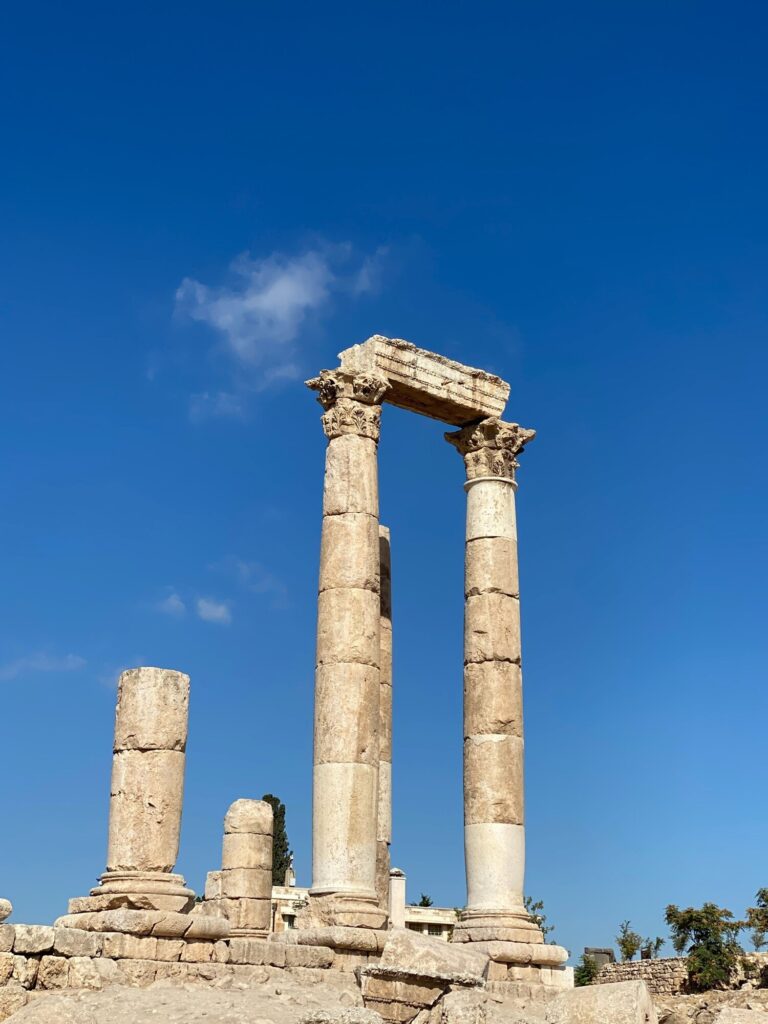
Jordan is a small country in the Middle East, bordered by Israel, Saudi Arabia, the West Bank of Palestine, Syria, and Iraq. For my fellow friends from the States, it is about the size of the state of Maine. With a population of approximately 10 million (2 million of whom live in Amman), there is a lot of open space. Jordan is very safe and a relative peaceful gem in the Middle East. It is a Muslim-majority country but is fairly progressive in its policies and attitudes. It is located in a region that has been influenced by layer after layer of other cultures in its history. One of the many things that surprised me about Jordan was just how many events of historical and religious importance took place in this tiny country.
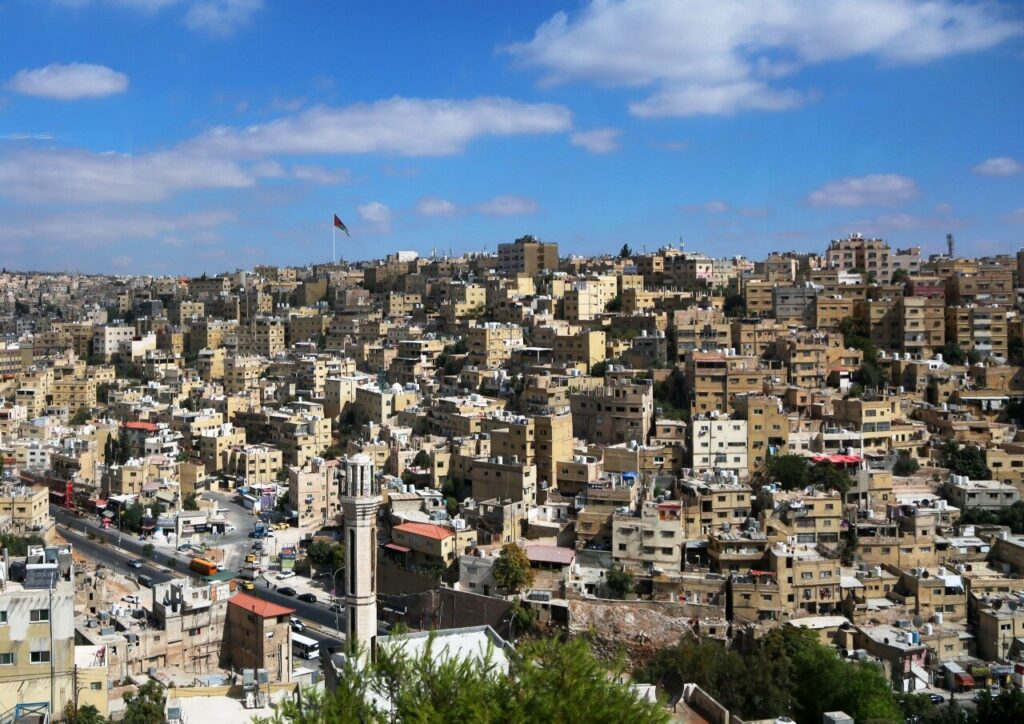
Photo Credit : Zeina Kassem
I absolutely adored Amman. It is a dense city with lots of traffic but no where near as chaotic as other cities where I have spent time. Fabulous ruins dominate the city center. We enjoyed many great meals of traditional Jordanian food, shopped the market, and had fun doing some shopping around Rainbow Street. Alleyways and side streets beckon you to explore. There are very old parts of the city and newer parts. There are lots of options for accommodations, from truly incredible 5-star hotels to unique locally owned boutique hotels. And the variety of restaurants fill every desire.
Amman is a very hilly city and there are stairs everywhere, taking you from one level to another. One certainly gets their fair share of exercise when navigating the city. And, being an old city, there are many parts with uneven walkways so good, comfortable shoes are a must!
Overlooking the entire city is the Citadel of Amman, sitting on the highest hill in Amman. The Citadel has been occupied since the Bronze Age and surrounded by an extensive wall. The highlights include the remains of the Temple of Hercules (pictured above, second from the top) and the Ummayad Palace, but there is much more to be explored. We all remarked upon entering the Palace that you could still feel a presence there. It is always amazing to me to stand in a place that was built hundreds of years ago and think about all who passed through and what happened throughout history. Fascinating. There is also a little museum with artifacts going back hundreds, thousands, even millions of years. And they have barely begun to really excavate large swaths of Jordan.
The Citadel also gives you an amazing view of the city, both old and new. Form the top of the hill, you get a complete 360-degree view of the entire city. All three of the photos from above were taken from the top of the hill. The very first photo is of the Roman Theater, located in the center of town. And that is where we descended to next.
The Roman Theater was built in the 2nd Century when the Romans occupied the region. Back then, Amman was called Philadelphia. It was built to seat 6,000 people and was used for cultural activities, both then and now. The highest seats were considered the best as they offered great views and the actors could still be clearly heard because of the design. It is a bit steep so we did not climb up too far. But one of our gang did do an MC Hammer dance in the theater and we have video proof!
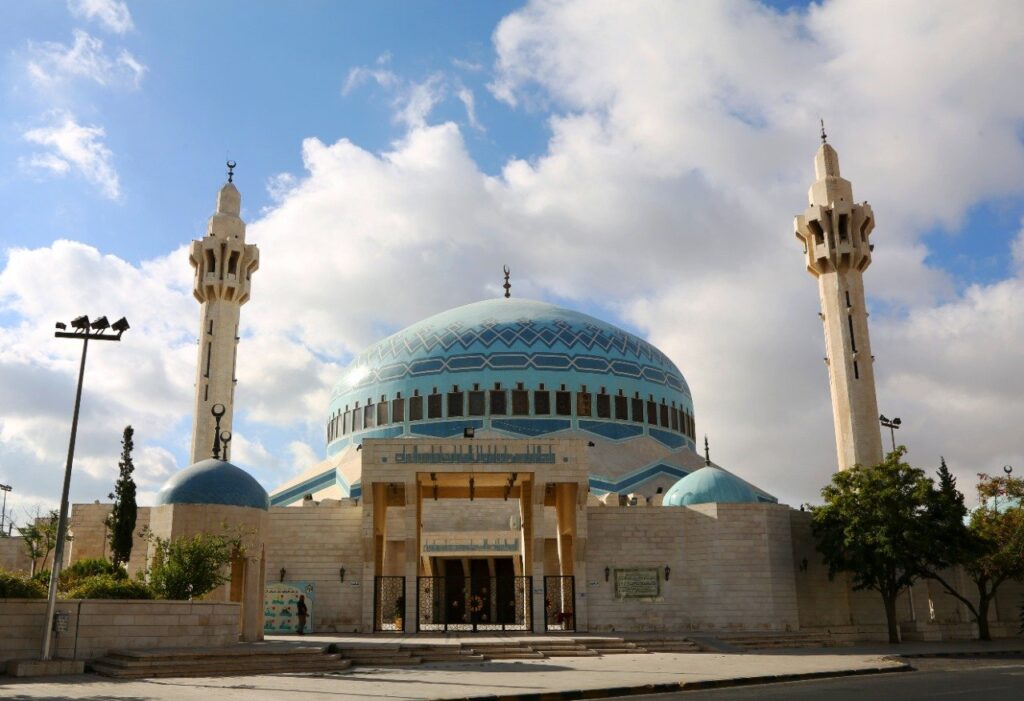
Photo Credit : Zeina Kassem
I also highly recommend a visit to the Blue Mosque. With its blue dome and tall spires, it dominates this part of the city. It is simple on the inside but quite striking. We were able to visit and learn more about the Muslim religion and prayer practices. We did have a Handmaid’s Tale moment as we all filed in, the women dressed in hooded robes loaned to us by the kind staff at the mosque (see photo below). There is also a beautiful series of shops with a treasure trove of Jordanian handcrafts. And right across the street is a Christian church, peaceably coexisting with its neighbor.
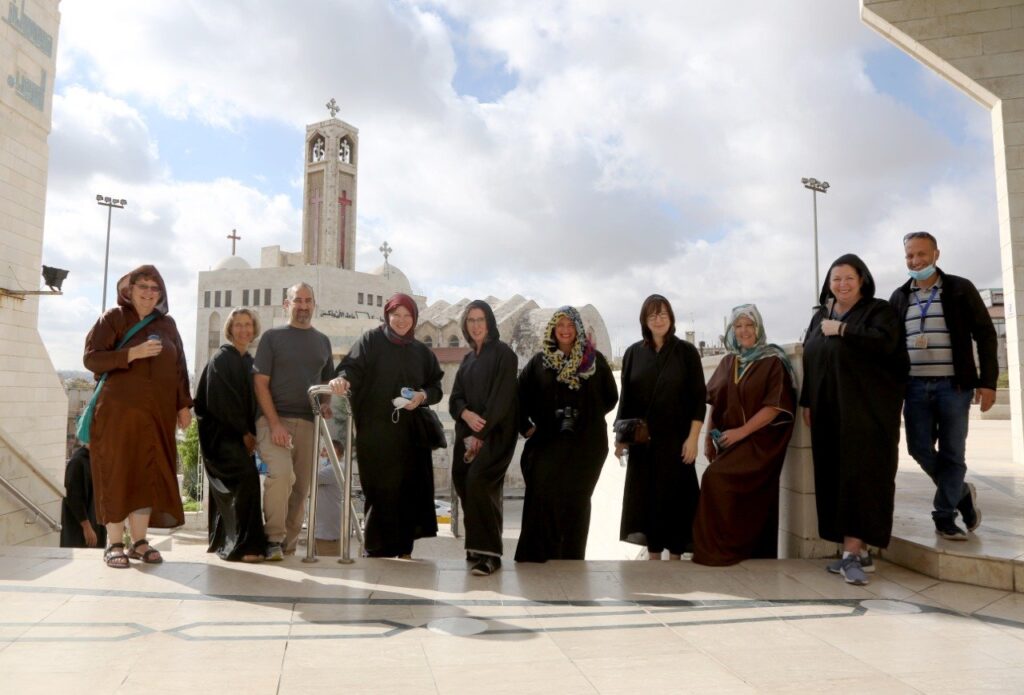
We were busy with a lot of other travel advisor work so we did not get a chance to visit The Museum of Jordan but I highly recommend it. I t gets rave reviews. The museum does a great job of tracing the history of Jordan in an interesting and interactive way. Worth a visit.
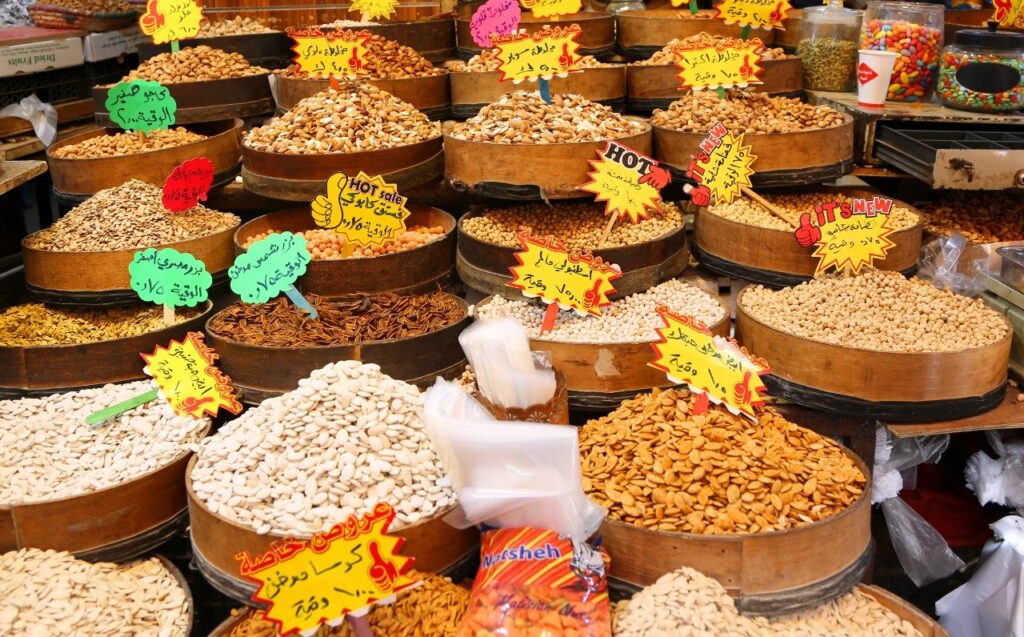
Photo Credit : Zeina Kassem
One of my favorite things to do in any foreign city is to stroll the food and spice markets. To truly begin to understand a culture, a food market tells you about what and the way a people cook. You also get introduced to spices and produce not found at home. The market in Amman did not disappoint. And, yes, some spices did find their way into my suitcase!
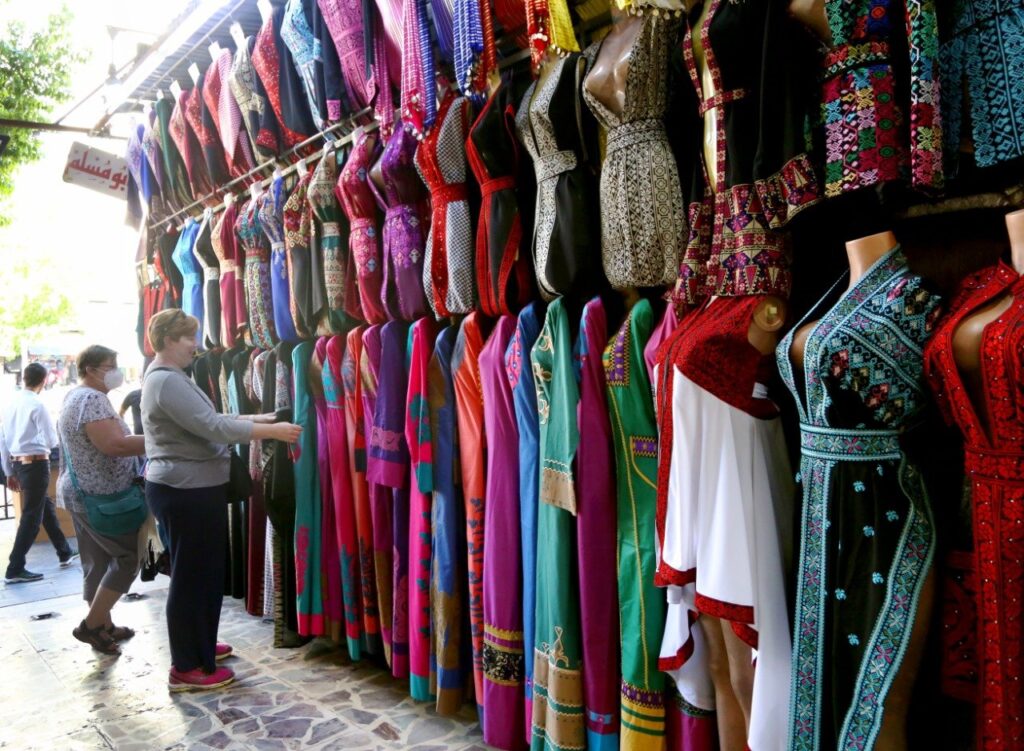
Photo Credit : Zeina Kassem
From the moment I entered the Royal Jordanian flight to fly to Amman, I was transfixed by the traditional dresses that were worn by many of the flight attendants. Called Al-Madragah, these dresses have the most beautiful embroidery designs. They are truly a work of art. Some are subtle, some bold, but all gorgeous. We had much fun admiring all of the beautiful colors and workmanship. And, yes, many of us left with a bag of goodies. You will all have to wait until I write the post about the end of the trip to see the dress I wore to our farewell dinner!
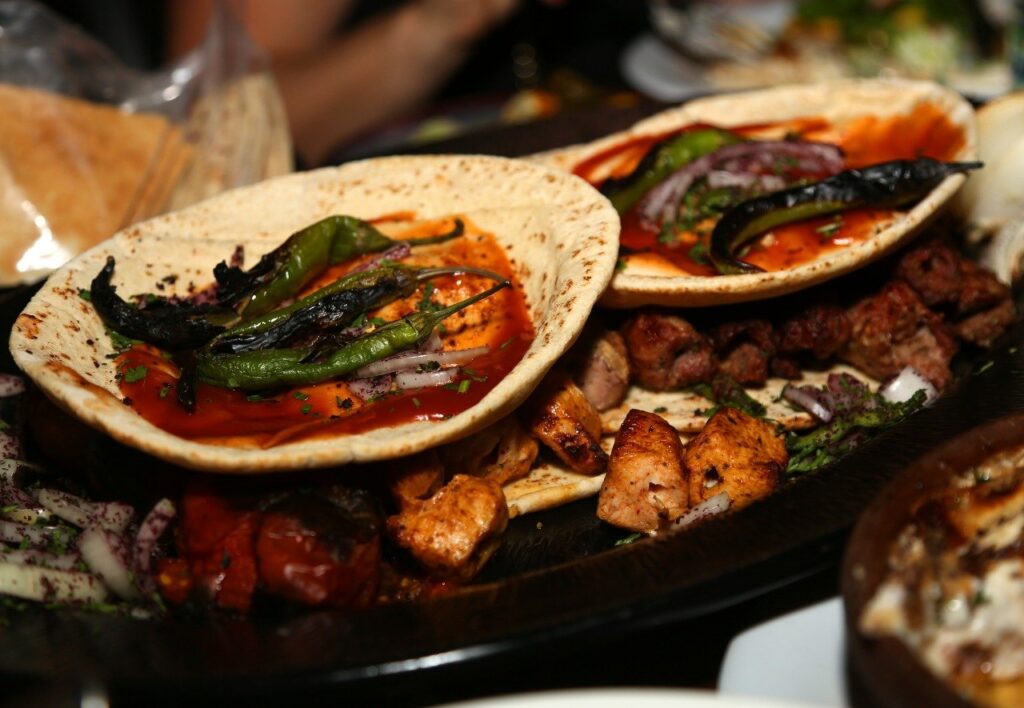
Photo Credit : Zeina Kassem
I could write an entire blog post on the food of Jordan! My favorites were probably in Jordan. You will eat a lot of hummus if you travel to Jordan but it is the best hummus I have ever tasted. Most chefs make hummus in the traditional Lebanese way and it is excellent. On a random meet up with the chef at the Fairmont in Amman, we were treated to one if his special ones. I don’t know what was in it but there were many happy groans in the group. Served on hot pitas they made just for us. My mouth still waters!
Most of the meals we happily ate were traditional Jordanian cooking. Though there are fusion, western, and restaurants from other global cooking styles, we wanted to sample all we could of the local food. The traditional recipes are meat heavy (lamb, chicken, and beef), but there are plenty of dishes from fresh produce and salads to round everything out.
Jordanians have a very hard time hearing no when it comes to food so we often had tables laden with food. And everything is served family style, making it a true communal feast.
And who knew that Jordan has a wine region with some fairly decent wines! The wine region is in the north and produces a variety of wines. We had a lovely meal and wine tasting at the restaurant of Jordan River Wines. Their rose was excellent! So good, in fact, that the group continued to drink it throughout the entire trip.
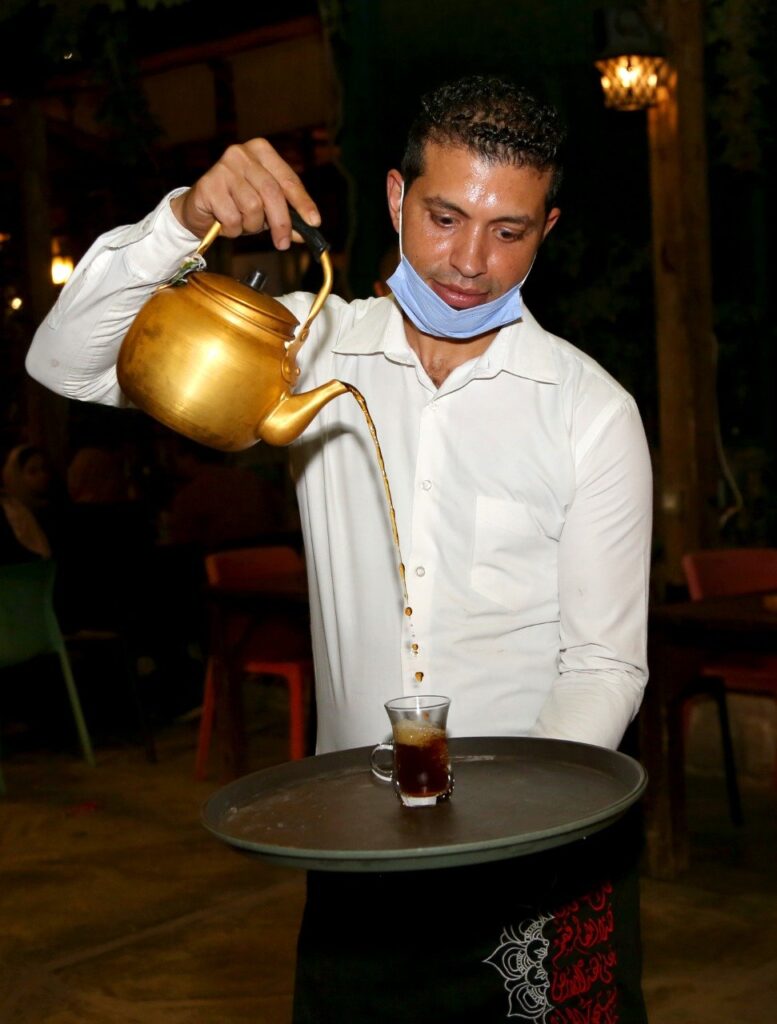
Photo Credit : Zeina Kassem
The coffee in Jordan is strong, like Turkish coffee. A small cup is always offered when you go to someone’s house and it is considered rude not to accept.
My favorite, hands down, is their mint tea. They brew it with a good tea and spearmint leaves. Just excellent. I drank it every chance I could. And the show, pictured above, of watching them pour the coffee or tea is worth ordering it alone!
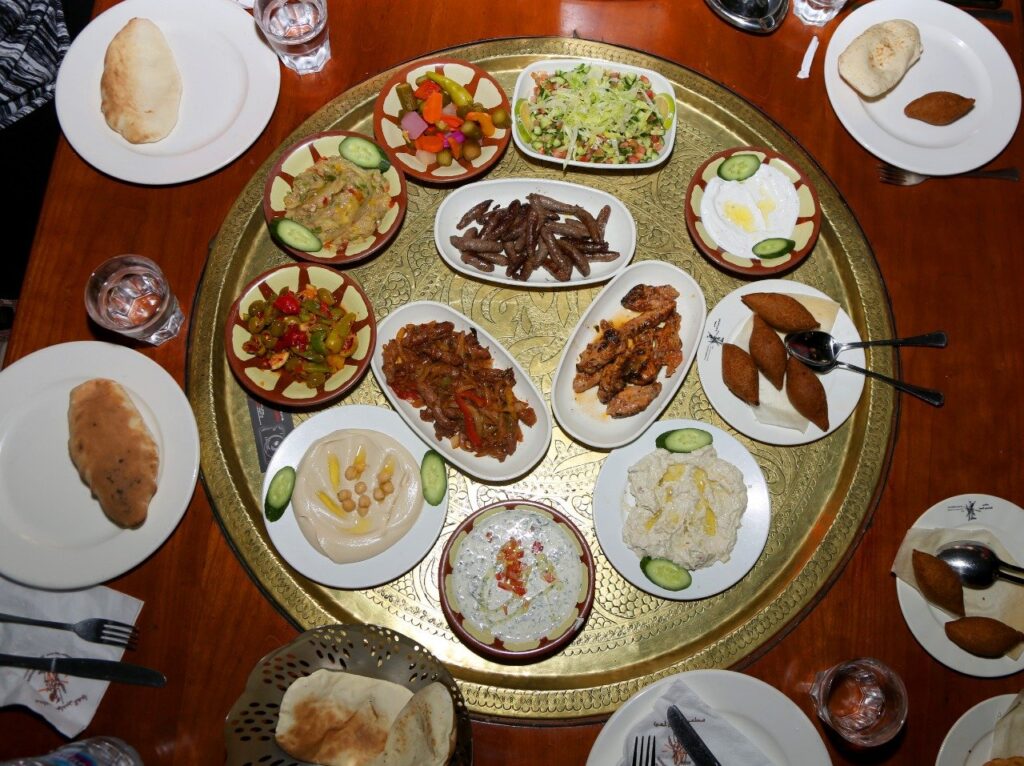
Photo Credit : Zeina Kassem
I will leave this first post on that lovely food note.
Check back soon for more of the trip! Next up … Jerash, Mt. Nebo, Madaba, and Um Ar Rasas.
© Beth Rowan https://www.tapestry-travel.com/blog/the-magical-kingdom-of-jordan-part-1